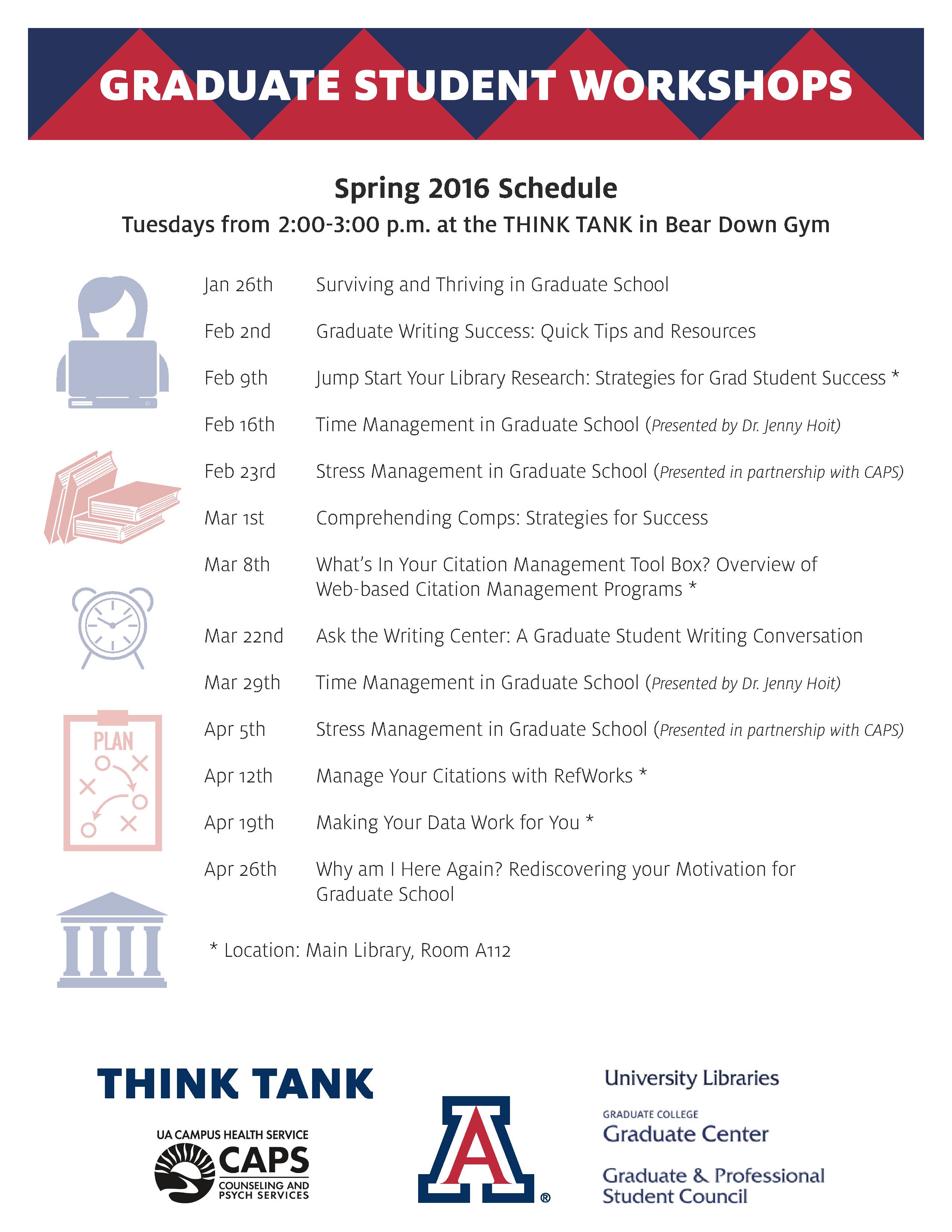Commission for Academic Support in Higher Education
Friday, 8 July 2016 - 1:33pm
By Amanda Parkman, Academic Skills Coordinator at THINK TANK (University of Arizona)
When we think about academic support centers the targeted audience we think of is typically undergraduates. Some centers may highlight the use of their writing center for graduate students and even offer workshops for students writing a thesis or dissertation; however, where is the depth in academic support for graduate students, similar to what we offer to undergraduates? During freshmen orientation we tell the incoming students that college is different than high school but isn’t graduate school different from the time during an undergraduate career? The amount of readings, the expectation of autonomy, the level of critical thinking, and time spent in the classroom are among a few of the differences between undergraduate and graduate school.
In spring 2015 THINK TANK (academic support center) at the University of Arizona began piloting a workshop series geared toward graduate students. During that first semester we offered just a couple of workshops that covered topics such as time management, stress management, and library resources (in partnership with UA Libraries). Attendance was strong at these workshops; the first workshop saw 12 attendees (this was with minimal marketing)! Piloting the workshops gave us the opportunity to gauge graduate student interest and gather feedback from them on topics they wanted to see.
The development of these workshops began with many discussions with other departments around campus. We knew there were several other departments on campus focused on graduate student support i.e. Graduate and Professional Student Council and the Graduate Center. Although both areas provide various support and resources to graduate students, much of the support is professional/field specific. During our exploration phase many departments and UA staff members commented how there was a need to provide academic support to graduate students.
The same sentiment was voiced by the graduate students who attended the workshops. Many of the graduate students said that they appreciated these workshops because the workshops validated the graduate student experience.
Here are a couple of quotes from graduate students who attended a workshop(s):
“The workshops have provided useful tips and ideas regarding writing and time management in graduate school. I wish I would've attended during my first semester! These workshops have helped me become a more successful graduate student.” –Monique P. Grad student in Library and Information Science
“The THINK TANK Graduate Workshops have been extremely helpful to me as I continue to discover and learn new and effective strategies to navigate graduate school. As a first-generation graduate student there are many avenues about higher education that I find myself traveling within and through that are very new to me. The THINK TANK workshops that I have attended so far have helped me gain important information to succeed in my doctoral program. Most recently I attended a workshop that talked about the comps exams process and I found the information extremely useful because I did not know what types of questions to ask to get myself ready for such an important milestone in my graduate education. THINK TANK workshops are an important and often undervalued resource for graduate students. It would be great for more graduate students to attend these invaluable workshops in order to sustain them for future graduate students.” Joanna S.-A., Doctoral student in the Rhetoric, Composition, and Teaching of English (RCTE) program.
Since the first semester, the workshop series has grown in the number of different workshops offered and the partners who work together to offer these workshops to graduate students.

http://thinktank.arizona.edu/sites/thinktank.arizona.edu/files/u132/GW-Spring16-schedule.pdf
The most challenging aspect in offering these workshops is getting the word out about them. We utilize multiple avenues from social media, listservs of our different department partners (i.e. GPSC, Graduate Center), and emailing graduate coordinators to share on department listservs.
Once students hear about them, they keep coming back. Out of all the different programs I work with, it is this program that I have students stop me around campus saying they attended a workshop and it helped them so much. Many students continue returning to workshops because they find that the workshops offer them a safe space and connects them with graduate students who are facing similar situations as them. For example with the “Thriving and Surviving Graduate School” workshop it is usually graduate students who have been in their program for about a year who attend. They come because they have found that they are not sure if graduate school is for them or if there are strategies they could be engaging in to make the experience easier. The students often articulate how overwhelmed and stressed they are (and I encourage them to attend the workshop led by Counseling and Psychology Services (CAPS)). They often feel they are the only ones in their programs feeling that way. Through group discussion, they quickly learn that they are not the only ones and that in fact these feelings are common across disciplines. They walk away from the workshop feeling validated and with new strategies they can implement.
Does your institution at your academic support center offer support services for graduate students? Please feel free to share the programs/services offered at your institution in the comments below!
Are you interested in learning more about the Graduate Student Workshop series at THINK TANK? Please feel free to ask your questions below (someone else may have the same question!) or you can email me directly at aparkman@email.arizona.edu.

